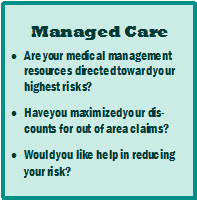This article is part of a series of case studies—real stories of how managed care companies increased profits by using Summit Re’s resources to increase sales, decrease expenses, and manage claims. You may be aware of Summit ReSources' consultative case management and managed care programs, but what you might not know is that our Managed Care Specialist is available to perform an in-depth assessment of your own medical management practices and procedures. This helps you ensure that your medical management is effective and efficient, not only for the benefit of your bottom line, but it also may ensure optimal outcomes for your members.
Goal: Reduce Admissions
ABC Health Plan recently contracted with Summit ReSources’ Managed Care Specialist to perform an evaluation of its medical management department. The overall goal of the health plan was to shift away from intense inpatient utilization management and focus on outpatient case management. In other words, the health plan recognized the importance of implementing steps to prevent the inpatient admissions in the first place.
On-site Evaluation
An on-site evaluation included staff interviews and assessments of policies, procedures, processes, and computer systems. Some of the issues addressed included:
- Are the health plan’s policies and procedures consistent with the NCQA standards?
- Are staffing patterns consistent with national benchmarks?
- What is the most cost-effective way to perform utilization management?
- What are appropriate outcome measures for medical management?
- What key features should be included in a disease management program?
- Which members should be referred for disease and case management?
- What are appropriate measures for return on investment for disease management and case management?
- What key features should be included in a predictive model?
Recommendations
Recommendations were made related to maintaining only the utilization management process that would provide the greatest clinical and financial value to the organization.
Since ABC Health Plan did not have a well-developed case management program, specific recommendations for the development of such a program were provided, including but not limited to, examples of case management referral triggers, screening tools, acuity measures, and return-on-investment documentation.
Post evaluation, there were several additional phone conferences regarding implementation of the recommendations.
The feedback from ABC Health Plan was that the assessment and recommendations were “crucial” and “most helpful” in moving the process forward to meet the overall goals of the organization.
Summit ReSources is available to provide an evaluation of your medical management program. Whether you are a small or large managed care organization, eliciting an outside evaluation of your medical management efforts can be beneficial. Summit Re works with efficient, cost-effective health plans, but most understand the need for continual improvements in medical management given the rapid changes in health care.


